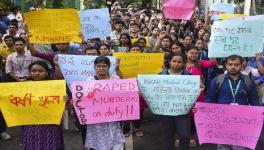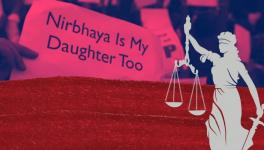Public Safety Act: with Continuing Arbitrary Detentions, Dissent has no Place in Naya Kashmir
After the abrogation of Article 370, little has changed on the ground in Kashmir. The arrest of journalist Sajad Gul shows how the Public Safety Act is being used as a weapon to stifle dissent, write ABDUL HANNAAN KIRMANI and RAJESH KUMAR.
RECENTLY, Kashmiri journalist Sajad Gul was arrested and booked under the Jammu and Kashmir Public Safety Act [JKPSA], a day after a court granted him bail in connection with a police case that accused him of criminal conspiracy. Gul was working with The Kashmir Walla and was arrested by police for allegedly “spreading disinformation through fake tweets regarding the recent anti-terrorist operation”.
JKPSA was promulgated by Sheikh Abdullah, the then chief minister of Jammu and Kashmir, in 1978. It provided the administration with sweeping powers to detain any individual on mere apprehension or suspicion. JKPSA can be traced back to the Defence of India Act of 1915, passed during the colonial era. and is considered as an iteration of the Public Safety Act of 1946 in colonial Kashmir. The Public Safety Act of 1946 was implemented to preventively detain the members of the “Quit Kashmir Movement” on grounds of “public order”.
The enactment of JKPSA was justified by its stated rationale that it will be used against timber smugglers to protect the forest cover, but rarely have timber smugglers been booked under this law. In reality, the Act has been exploited to gain political advantage and control over the voices in the erstwhile state.
On August 5, 2019, the state of Jammu and Kashmir was stripped of its special status and demoted to the status of a Union Territory [UT of JK], a step that ensured the union government’s direct control over the region. The effective abrogation of Article 370 of the Indian Constitution allowed all the legislations passed by the Indian Parliament to apply to the UT of JK, and repealed most of the acts passed by the erstwhile state assembly. One of the acts that was not given the metaphorical axe was the JKPSA.
Also read: Tracking the first year of ‘Naya Kashmir’
Preparations for the unilateral decisions of August 5 were made well in advance, and on the day of the abrogation, the full force of the State machinery came hammering down on the population through curfews, arrests, detentions, and telecommunication shutdowns, among other things. Such wide-ranging changes were effected on the ground through subversions and ‘weapons’. In the arsenal of weapons at the State’s disposal, the Public Safety Act stands out.
In reality, the Act has been exploited to gain political advantage and control over the voices in the erstwhile state.
It is an Act passed by the state legislature; thus, tailored to deal with local circumstances, and has a history of being used brazenly and arbitrarily during periods of popular uprising. For instance, we can take a look at the use of JKPSA during the summer uprisings of 2010 and 2016. In 2010, 322 people were booked under JKPSA between July and September; in 2016, this number shot up to 921 in the weeks following the militant Burhan Wani’s killing. Therefore, consecutive governments have not shied away from using this law to detain people without trial. Through reports published by various civil society organisations (such as this one by international human rights NGO Amnesty International), it is evident that the targets of the law are youngsters and those involved in resisting the regime.
Silenced voices
The socio-political paradigm of Kashmir is going through a dynamic process of change. It is not possible to delineate such changes with exactitude here, but the ramifications are apparent in terms of the state of media in Kashmir, or the silenced social spaces of the valley. In this process of change, the JKPSA has a key role. People who question power or challenge this change (two things that are not necessarily different) have time and again been detained. Gul’s is but one such example.
Also read: Freedom of press compromised in Kashmir
Coming from the Shahgund area in Bandipora district, Gul is a 26-year-old journalism student studying Convergent Journalism from the Central University of Kashmir. He was detained under the Public Safety Act on January 16. Gul is no stranger to being harassed by authorities: the earliest FIR [first information report] against him dates back to February 2021. He came into the crosshairs of public officials after he broke the story of a demolition drive being carried out in Bandipora. The concerned tehsildar had threatened Gul with dire consequences. But the FIR which became the reason for his arrest and subsequent PSA detention was filed earlier this month. This FIR followed a string of visits by army personnel to his house: he was facing harassment from officials for doing a story about a gun battle in which the family of the slain claimed that it was an extra-judicial killing.
In Gul’s case, the officials had been threatening arrest for a long time in an attempt to silence him. But, when he did not budge, they arrested him under Sections 120B (Punishment of criminal conspiracy), 153B (Imputations, assertions prejudicial to national-integration), and 505(2) (Statements creating or promoting enmity, hatred or ill-will between classes) of the Indian Penal Code. Thereafter, Gul was granted bail by a local court in this case.
Realising that his release was imminent, police moved quickly to detain him under the JKPSA. Yet again, JKPSA proved to be the weapon of choice that it is so vehemently criticised for being.
Thought crime and JKPSA
As has already been mentioned, preparations for the abrogation of Article 370 were carried out well in advance. Therefore, detainment of people preceded the actual announcements of August 5. After two years of the incident, it has come to light that people were also detained for their ideology right before the abrogation. It is pertinent to note that ideology has nothing to do with detention in JKPSA under Section 8 of the Act. To illustrate our point, we discuss the case of Mian Qayoom.
Effectively, the alleged ideology of Qayoom was held to be enough to detain him.
Senior Advocate and then president of the Jammu and Kashmir High Court Bar Association, Mian Abdul Qayoom was put under preventive custody on the intervening night of August 4 and 5, 2019 under Sections 107 and 151 of the Criminal Procedure Code. Afterwards, on August 7, 2019, his detention was ordered under the JKPSA by the District Magistrate through Order no. DMS/PSA/105/2019. His detention order contained grounds of detention that traced his activities to FIRs lodged in the years 2008 and 2010.
The writ petition filed on his behalf in the Jammu and Kashmir High Court was rejected and subsequently, a Letter and the Patent appeal was filed. This appeal was heard by a division bench of Justice Ali Muhammad Magray and Justice Vinod Chatterjee Koul. Justice Magray, who delivered the final decision, responded to the seven submissions of the appellant. The counsel for the appellant had argued that the alleged activities of the detenu don’t necessarily provide a live and proximate link to an immediate need to detain him. The activities in question were alleged to have emanated from the ideology of the detenu. This ideology was defined by Justice Magray in para 48 as ‘like a live volcano’. Effectively, the alleged ideology of the detenu was held to be enough to detain him.
Also read: Towards a political paradise of caged parrots
Broad and vague grounds
Section 8(1)(i) of the Public Safety Act provides for the detention of any person acting in a manner that is prejudicial to ‘public safety’ and ‘security of the state’. These two terms are not defined anywhere in the Act and thus have fallen prey to abuse. It is surprising to see the frequency of these terms in detention laws but no subsequent effort to define them. When PSA dossiers are drafted based on police reports and other relevant material, the wordings used therein are similarly broad and vague.
Courts have repeatedly highlighted the need to mention specific instances instead of mere blanket assertions in detention orders. In Mohammad Yousuf Rather vs. The State of Jammu & Kashmir (1979), the Supreme Court held:
“This Court has disapproved of vagueness in the grounds of detention because that impinges on the fundamental right of the detenu under Article 22(5) of the Constitution to make a representation against the order of detention when the grounds on which the order has been made are communicated to him. The purpose of the requirement is to afford him the earliest opportunity of seeking redress against the order of detention. But as is obvious, that opportunity cannot be said to be afforded when it is established that a ground of detention is so vague that he cannot possibly make an effective representation”
But, Yousuf Rather faced a blow by the insertion of Section 10A into the Act in 1985. This section, in our view, is singularly responsible for the arbitrary and illegal detention of many people. It provides for the severability of grounds. The text of the section reads that “such order shall not be deemed to be invalid or inoperative merely because one or some of the grounds is or are––(i) vague (ii) non-existent, (iii) not relevant …”
Now with the grounds being severable, detention can stand on each one of them separately. Therefore, if one ground of detention is vague, it would not vitiate the complete order. This provides for a unique problem, which is somewhat illustrated through Qayoom’s case.
Also read: Journalist Bodies Fear Increased Curbs on Reporting in J&K after IGP Kashmir’s Remarks
In Qayoom’s case, reliance was placed on confidential intelligence reports which the Judges were shown but the detenu was not provided with. The non-disclosure of such information finds statutory backing in Section 13(ii) of the Act. But, in a case where detention fails on all grounds but stands on the ground of alleged activities that are mentioned in confidential reports, would the rights of the detenu be violated?
This situation is a quandary, in which the detention order stands on information that is not available to the detenu and it can’t be quashed on other grounds.
This situation is a quandary, in which the detention order stands on information that is not available to the detenu and it can’t be quashed on other grounds.
Revolving door detentions
A prominent ground of detention that finds mention in PSA detention orders is: “there was every apprehension of your [detenu’s] bail”. This leads to a phenomenon that has been described as ‘revolving door detentions’. When a person is arrested under ordinary penal law and they are able to secure bail, the police, in order to ensure their continued detention, takes them in under the JKPSA. Alternatively, when a detention order is quashed or expires, another order is passed.
This is prominently illustrated in the case of Kashmiri separatist leader and Jammu Kashmir Muslim League Chairman Masarat Alam Bhat. He is alleged to be pro-Pakistan and has been under preventive detention for some 11 years now. He was appointed as the chairman of the separatist umbrella political party Hurriyat Conference after the death of separatist leader Syed Ali Shah Geelani in September 2021. The table below gives a timeline of the 22 detention orders out of the 38 Masarat Alam has faced.
Also read: Syed Ali Shah Geelani’s Unfulfilled Last Wish: violation of rights under Article 21?
JKPSA Detention Timeline of Masarat Alam Bhat
Data collated by the authors from various High Court judgements
| S.No. | Dated | Order No. | Quashed | Released | Case Number |
| 1. | 25.01.2001 | DMS/PSA/98 | 13.11.2001 | No | HCP No. 27/2001 |
| 2. | 18.01.2002 | DMS/PSA/52 | 23.04.2003 | – | HCP No. 96/2002 |
| 3. | 28.04.2007 | DMS/PSA/03/2007 | 01.10.2007 | – | HCP No. 108/2007 |
| 4. | 16.01.2008 | DMS/PSA/26/2007 | 23.05.2008 | – | HCP No. 30/2008 |
| 5. | 09.09.2008 | DMS/PSA/20/2008 | 27.12.2008 | No | HCP No. 223/2008 |
| 6. | 21.01.2009 | DMS/PSA/41/2009 | 25.5.2009 | No | HCP No. 30/2009 |
| 7. | 09.06.2009 | DMS/PSA/14/2009 | 18.08.2009 | No | HCP No. 108/2009 |
| 8. | 12.09.2009 | DMS/PSA/39/2009 | 29.10.2009 (revoked) | No | HCP No. 191/2009 |
| 9. | 19.11.2009 | DMS/PSA/39 | 30.12.2009 | No | HCP No. 239/2009 |
| 10. | 02.02.2010 | DMS/PSA/65/2009 | 08.03.2010 | – | HCP No. 25/2010 |
| 11. | 11.12.2010 | DMS/PSA/112/2010 | 10.06.2011 | No | HCP No. 49/2011 |
| 12. | 04.08.2011 | DMS/PSA/14/2011 | 23.12.2011 | No | HCP No. 304/2011 |
| 13. | 30.12.2011 | DMS/PSA 1155 | 02.06.2012 | – | HCP No. 5/2012 |
| 14. | 03.08.2012 | – | 19.10.2012 | – | HCP No.112/2012 |
| 15. | 30.10.2012 | – | 8.03.2013(revoked) | No | – |
| 16. | 21.04.2015 | – | 21.08.2015 | No | HCP No. 32/2015 |
| 17. | 01.09.2015 | 5/PSA (DM of Jammu) | 29.12.2015 | – | HCP No. 64/2015 |
| 18. | 01.09.2016 | 85/DMB/PSA/2016 | 27.12.2016 | No | HCP No. 395/2016 |
| 19. | 08.05.2017 | 25/DMB/PSA/2017 | 26.10.2017 | No | HCP No. 177/2017 |
| 20. | 14.11.2017 | 17/DMK/PSA/2017 | 12.11.2018 (expired) | No(rearrest) | – |
| 21. | 13.11.2018 | 90/DMB/PSA/2018 | 16.05.2019 | – | HCP No. 443/2018 |
| 22. | 25.05.2019 | – | 02.07.2021(disposed) | – | WP (Crl) No. 578/2019 |
We see a repeat of this phenomenon in the arrest and subsequent detention of Gul. His detention order, in addition to the ‘apprehension of bail’ grounds, reads that his reporting was critical of the Union Territory and he kept searching for anti-government news. Importantly, this order came just after Gul was granted bail by a local court. Peerzada Fahad, the editor of The Kashmir Walla, says that Gul’s arrest was vindictive and the PSA detention was ‘an easy way’ to keep him away.
Also read: ‘No Fetters on Freedom of Press’: J&K HC Slams FIR Against Journalist Asif Naik
When a person is arrested under ordinary penal law and they are able to secure bail, the police, in order to ensure their continued detention, takes them in under the JKPSA. Alternatively, when a detention order is quashed or expires, another order is passed.
Union Home Minister Amit Shah, while addressing the Parliament on the day of the abrogation of Article 370, said, “I partially agree that there is lack of trust between the people of J&K and rest of India; it is because there was no effort to build that trust”. Two and a half years into the abrogation, we are seeing no signs of any such effort by the government. If anything, the rampant use of PSA is corroding trust, or whatever was left of it.
(Abdul Hannaan Kirmani is a research intern at J&K Coalition of Civil Society, and Rajesh Kumar is an intern with The Leaflet. Both are first-year undergraduate law students at the National Law University, Delhi. The views expressed are personal.)
Get the latest reports & analysis with people's perspective on Protests, movements & deep analytical videos, discussions of the current affairs in your Telegram app. Subscribe to NewsClick's Telegram channel & get Real-Time updates on stories, as they get published on our website.
























